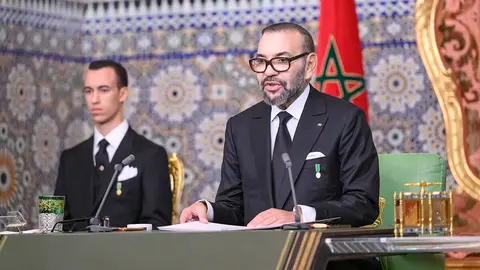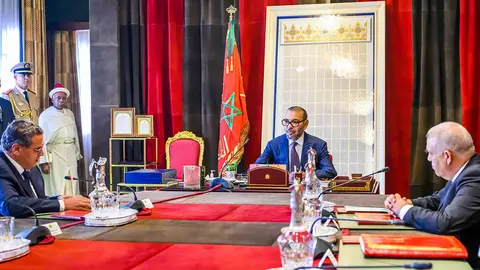Abdelillah Benkirane attacks feminist demands to revise Morocco's Family Code

Former Moroccan head of government Abdelillah Benkirane criticised the progressive feminist women's movement for gender equality as aiming to destroy society, describing those demanding equality as "ignorant". He argued his point of view by the fact that the family in the West was annihilated by a series of concepts, and called on the women of the party to be brave enough to face their threats towards Morocco, considering them "militia defenders of the reference".
The body in charge of reforming the Family Code has begun to receive various proposals from civil society associations, including suggestions from women's organisations. This has been categorically rejected by the radicals, led by those who declared in a communicative meeting with the women's organisation of the Justice and Development Party that "equality is not possible in marital relations and sexual relations between men and women"; asking "how to equate those who enjoy in minutes with those who destroy their lives", referring to sexual relations outside marriage that have their repercussions on women.
Progressive women's organisations aim to pressure the Consultative Committee in charge of amending the Family Code to adopt as many of their demands as possible, especially the sensitive demands of equality and inheritance, which continue to be rejected by the Islamists, led by the Secretary General of the Justice and Development Party, Abdelillah Benkirane.

"There are mothers who ask me how to behave in front of people who manipulated their daughters, while (those calling for decriminalising sexual relations outside marriage) want nothing more than to ruin society, and the one who pays the price is the woman who has been defeated since they introduced the concept of equality," Benkirane explained.
Given that Islam remains the main frame of reference of the Family Code, the progressive feminist movement calls for "a comprehensive reform of the Family Code in order to transform it into a civil law based on gender equality in all its parts".
During its meeting with the committee charged with amending the Family Code, the Free Feminist Union proposed "to include equality between men and women in the issue of inheritance and to lift the ban on inheritance between Muslim/Muslim and non-Muslim/non-Muslim women".
Khadiya Tahiri, a member of the Free Feminist Union, said that "the fundamental principle to be applied is to guarantee equality and non-discrimination, in accordance with the spirit of the Constitution and Morocco's international obligations, in particular the Convention on the Elimination of All Forms of Discrimination against Women and the Convention on the Rights of the Child".
However, according to Benkirane, "Islam does not equalise between men and women, but holds the husband responsible for what happens naturally to him"; praising the work done by women in caring for their families and working outside the home.

The Secretary General criticised activists who claim gender equality, saying that "society is not Simone de Beauvoir (one of the symbols of women's emancipation), Latifa Jbabdi (Moroccan human rights activist and leader of the Socialist Union) and Amina Bouayach (president of the National Council for Human Rights), but society is the group of women who understand this without being able to talk about it".
Benkirane returned to the oppositional stance with which he had confronted the National Plan for the Integration of Women in Development, declaring that "we entered a battle and we won it, but there are those who demand things like the annulment of the wilaya (guardianship), so that women can marry without a guardian".
It was the same position he took on the division of property acquired during marriage, believing that the establishment of this principle would make men reluctant to marry, and cause those who do marry problems that would take them to court.
"These people (demanding reforms) are really ignorant," he said in his statement; furthermore, there is no upper limit to the amendments the state will introduce to the Family Code, and King Mohammed VI said he "will not allow what is forbidden (haram) or forbid what is permitted (halal)". This clarified that nothing will be taken out of the definitive articles argued by indisputable texts; however, organisations with progressive leanings are clinging to a "radical" revision of the Family Code," Benkirane added.
During their meeting with the Consultative Committee in charge of amending the Family Code, the leaders of the Free Feminist Union confirmed that "equity for women in the Family Code must be based on the abolition of the concept of guardianship," Tahiri said.

In a statement to the Moroccan newspaper Hespress, Tahiri said: "We have called for the abolition of the concept of guardianship in the Code and in all other laws, because keeping it means keeping a series of articles that enshrine women's dependence on men, in maintenance, divorce, marriage and division of property...".
In addition to removing the ban on inheritance between Muslims and non-Muslims, the Union advocated lifting the ban on marriage between Moroccan Muslim women and non-Muslim men. "The law gives Muslim men the right to marry non-Muslim women, but prohibits Muslim women from marrying non-Muslim men, and we demand gender equality."
The demand to grant Moroccan women the right to marry non-Muslim men "is not an intellectual luxury, as there are Moroccan Muslims married to non-Muslim women, especially members of the Moroccan community living abroad, and the current law results in unequal practices, whereby non-Muslims are obliged to testify convincingly or only for the purpose of marriage; which also affects freedom of belief," Tahiri continued.
During the preparation of the current Family Code by the Consultative Committee charged with amending the Personal Status Code, the temporary obstacles to marriage provided for in Article 39 of the current Code, including marriage between a Muslim woman and a non-Muslim man, have been confirmed by consensus of the Committee members; so the content of Chapter 29 of the Personal Status Code remained as it is after slight modifications at the level of wording; according to the book "Preparatory work of the Family Code".

"Marriage of a Muslim to a non-Muslim woman, and a Muslim woman to a non-Muslim man, unless she is a Christian or a Jew", has been included in "temporary impediments to intermarriage"; according to Article 39 of the Family Code. An article that will remain far from any modification; as the prohibition is backed by a text from the Quran (Do not marry female associates until they believe. A believing slave is better than an associate, even if you like her better. And do not marry associate women until they believe. A believing slave is better than an associate, even if you like him more) Surah Al-Baqarah (The Cow), verse 221, Abdelilah Benkiraneh stressed.
Despite all this, the progressive feminist movement remains committed to "the right of women and men to enjoy equal conditions in matters of marriage", as Rachida Tahiri, a member of the Progress and Socialism Party declared; pointing out that marriages of Moroccans with non-Muslims (Christian or Jewish) also pose a problem concerning inheritance, as it does not guarantee the wife's right to her share of her husband's inheritance, asking "Isn't this sheer injustice?"
The rift between the feminist movement and the Islamic current seems to be widening with the revision of the Family Code. Benkiran had called for the withdrawal of divorce for dissent (atliq li a-siqaq) stipulated in the Family Code because, according to him, it is the factor that had increased the divorce rate.
In the same vein related to marital life, Benkirane opposed the demand to ban underage marriage, saying that "when a girl studies, it is fine, but how to refuse marriage for that peasant girl whose father has no financial means to support her and she already considers herself a woman in that environment?" he wondered, concluding that "if marriage is refused until she turns 18, will she ever ask for his hand again? And if not, who is to blame and who takes responsibility for that girl?"











